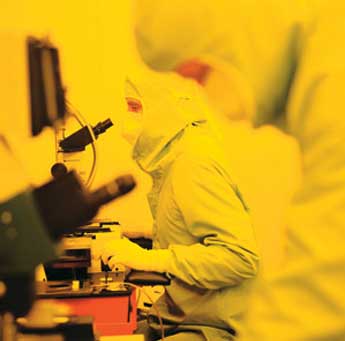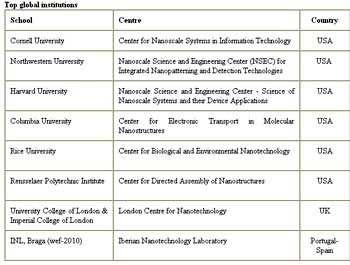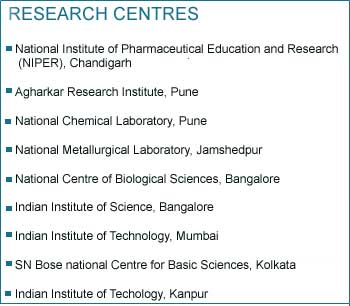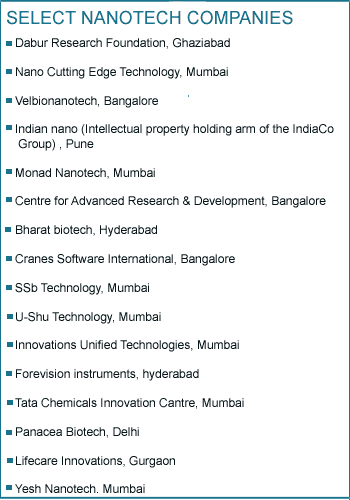
One millionth of a millimetre or 10-9 m, is a nanometre, and study of matter at that level is nanotechnology. Initiated as an idea by Nobel Prize winning physicist, Richard Feynman in early 1950s, nanotechnology caught up as a separate discipline only during the early 90s. The nanotechnology initiative set up in 2000, by the US federal government played a crucial role in providing seed funding for long-term research in the area. It has also caught up well in Europe.
India was one of the early entrants in the domain, thanks to the pioneering work of Professor CNR Rao, Linus Pauling Research Professor at JNCASR. Says Prof Rao in an interview, "India, still has not realised the full import of a general purpose technology like nanoscience. It has the potential to usher in a new industrial revolution."
The recently announced National Nano Mission is a step in the right direction, says Prof Rao.
Material versus molecular
Nanoscientists operate from either of these major vantage points. Some are excited about the behaviour of materials, when brought down to nano levels. In other words here scientists deal with reducing materials to nanosizes and observing the changes in their properties and behavior. Prof Lubik, a leading scientist contends that, "material such as gold, which is chemically inert at normal scales, can serve as a potent chemical catalyst at nanoscales. Much of the fascination with nanotechnology stems from these different phenomena that matter exhibits at the nanoscale."
On the other hand, another group of scientists are interested in using nanoscience to assemble individual atoms into a desired molecule so as to evolve molecular-level machines. But research in this domain is very much in infancy world over, and India has negligible presence in the area. But India does operate in the domain of using the conventional technologies used to manufacture nanomaterials such as carbon nanotubes and nanoparticles.
Careers360 is a complete careers magazine.

A majority of the institutions in the country offer MTech in nanosceince, and you have to be either a BTech or BE or hold a first class Master's degree in basic or applied sciences. Different institutions, depending on the research specialisations prefer either science or engineering graduates. So examine the nature of research in the institution and type of faculty they have before short-listing the college.
Mostly private universities offer Master's level courses in nanoscience, and generally MSc in nanoscience is through research as Amity offers. Here the basic eligibility is either a BTech or basic degree in Physics, Chemistry or allied sciences. If you are a science graduate, it does make sense for you to do a Master's in applied sciences before you go for an MTech degree says Prof A Choudhry, professor at Centre for Nanoscience at Guru Jambeswar University of Science and Technology.
According to Prof Bipin Nair, Dean, Amrita Centre for Biotechnology, it is always advisable to go for an MTech in nanoscience rather than an MSc, since an MTech invariably would come with a fellowship/stipend support.
The best place to pursue a nanotechnology Master's is USA, since the nano initiative of 2000 has resulted in five world-class centers being set up at Harvard, Cornell, Northwestern, Columbia and Renesseller. Each centre focuses on one special area. Germany too offers some good institutions like the centre at Dresden to work on nanoscience. But the best place in UK would be either the Imperial College, which offers a Master's degree by research, or the University College of London, which offers an MSc in nanotechnology.

Nanoscience is still evolving in India. Just over 15 colleges offer programmes in the discipline. So your choices are in fact limited. The best place to study nanoscience is the Jawaharlal Nehru Centre for Advanced Scientific Research, Bangalore. It has one of the largest concentrations of researchers working on different aspects. And the best part about this institution is entry is possible at all levels. Exceptionally bright graduates can enrol for an integrated MS/PhD programme. And the best part is almost all students get a stipend of Rs 8,000 per month at least in the initial years which go up as you progress.
Some of the NITs offer MTech programmes which are also a good bet, especially if you are GATE/ CSIR/ JRF qualified candidates. Naresh Yadav, an alumnus of NIT, Bhopal says that in terms of facilities, one can never beat the IITs or IIScs, but still his institute did have a very good faculty.
The IITs that have amazing facilities do not yet offer a formal degree, but you can always enrol for a PhD programme there. The few private universities like Amrita, Amity and SASTRA offer good facilities, but are relatively expensive, unless you manage to get to work as a project/research associate. But these positions are only available for PhD programmes.

Nanoscience is truly interdisciplinary in nature. The nature and structure of the course depends upon the area of specialisation that the course focuses on.
Normally the three chief divisions of nanotech are nanomaterials, nanoelectronics and nanobiotechnology. And the concentration of courses would be a function of your specialisation. For example, for its MS programme by research, Amity offers courses in biosciences, instrumentation, quantum concepts and nanostructures, synthesis of nanomaterials etc in the first two semesters, and students then select an optional paper depending on the domain they want to specialise in.
As Dr Shanti Nair, Dean, Amrita Centre for Nanosciences says, "An MTech is a 'hands on' programme where students learn to apply concepts and become skilled in the technology and learn to apply it to a variety of biomedical areas."

There are two major areas where qualified professionals are in great demand, nanomaterials and nanoelectronics, and nanobiotechnology. Nanomaterials and nanoelectronics are the biggest employer with over USD 100 billion worth coatings and composites manufactured for applications in diverse sectors like automobiles, textiles, aerospace, and consumer durables amongst others. Candidates with an MTech/ PhD in material sciences stand a good chance of a vibrant career in all these sectors. Job opportunities could either be in firms that develop nanomaterials or in the user sectors, as a specialist involved in application development.
Nanobiotechnology is a vibrant area, though its economic impact pales when compared to nanomaterials. Some of the areas wherein research is currently happening are nanomedicines, non-invasive surgery, sutureless surgical applications, targeted surface medical applications, nanoprobes...the application possibilities are endless.
Concludes Dr Jeyaprakash, assistant professor, Karunya University, "From converting sunlight into power, to targeting a drug to a single malignant cell, from creating sensors in the form of biochip to the ability to produce garments which can act as a chemical shield, possibilities are immense in this domain."